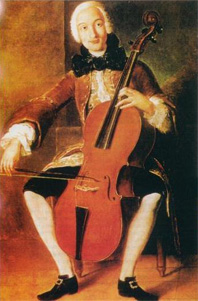Bocchenni was born in the Italian town of Lucca into a family
of talented artists and musicians. His father, a double-bass
player, was impressed with his young son's abilities as a cellist.
He sent him at the age of 13 to study in Rome with the Maestro di
Cappella at St Peter's, and later accompanied him to the Royal
Court in Vienna -the first of three visits before Boecherini was
21. In 1764 Boecherini visited the composer and organist Giovanni
Battista Sammartini in Milan, and the same year returned to Lucca
to play in the Theatre Orchestra. He composed intensively and
formed a string quartet, one of whose members was his friend
Filippo Manfredi. In 1766 he set off on a concert tour with
Manfredi, and visited much of northern Italy before arriving in
Fans in 1767. Here an outstandingly favourable reception at the
Concert Spintuel gave Boecherini the opportunity to publish
quartets, trios, and sonatas for keyboard and violin.
The eighteenth century was the era of technical virtuosity;
what Corelli and his followers had done for the violin, Boecherini
proceeded to do for the cello, with a series of ten cello
concertos that stretched players' abilities to the full. Most of
these are thought to have been written before he settled in Madrid
in 1769 to concentrate on chamber music. The invitation to visit
Spam came from the Spanish ambassador to Pans; Bocchenni soon
became a composer at the Spanish court. Here he wrote a large
amount of music suitable for court performance, mostly quartets
and quintets.
This post was followed by a spell at the court of Prince
Wilhelm of Prussia, but after Wilhelm's death Bocchenni returned
to Spam and from 1 800 he organized concerts and composed for
Lucien Buonaparte, Napoleon's brother. Boccherini's popularity was
such at one stage that his publisher m Paris issued quartets by
other composers under Boccherini's name. Nevertheless, Boecherini
died in poverty in Madrid in 1805.
Bocchenni wrote 18 symphonies, but his lyrical gifts show
themselves most strongly in his 300 chamber works. He composed 93
string quintets, with two cellos in place of the customary cello
and
double-bass contributing a vibrant and sensuous bass line. Nine
guitar quintets also form a part of his chamber output, in which
darting accents lend a bright and nervous freshness to music of
exceptional clarity. Already endowed with plenty of Italian
elegance and brio, the young man discovered in Vienna the
beginnings of Romantic passion: the spirit of Sturm und Drang
that adds so much drama to middle-period Haydn. His discovery
of Spanish dance rhythms and the elaborate guitar music of
Andalusia resulted in a distinctive and individual style that won
the admiration of Gluck, as well as influencing Mozart and Haydn.
|


No comments:
Post a Comment